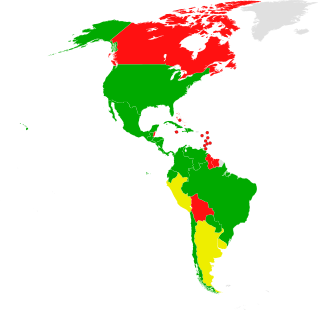Montevideo Convention
1933 pan-American treaty on statehood From Wikipedia, the free encyclopedia
The Montevideo Convention on the Rights and Duties of States is a treaty signed at Montevideo, Uruguay, on December 26, 1933, during the Seventh International Conference of American States.[2] At the conference, United States President Franklin D. Roosevelt and Secretary of State Cordell Hull declared the Good Neighbor Policy, which opposed U.S. armed intervention in inter-American affairs. The convention was signed by 19 states. The acceptance of three of the signatories was subject to minor reservations. Those states were Brazil, Peru and the United States.[3][1]
| Convention on the Rights and Duties of States | |
|---|---|
 Ratifications and signatories of the treaty Parties
Signatories
| |
| Signed | December 26, 1933 |
| Location | Montevideo, Uruguay |
| Effective | December 26, 1934 |
| Signatories | 20[1] |
| Parties | 17[1] (as of November 2021) |
| Depositary | Pan American Union |
| Languages | English, French, Spanish and Portuguese |
| Full text | |
| Montevideo Convention at Wikisource | |
The convention became operative on December 26, 1934. It was registered in the League of Nations Treaty Series on January 8, 1936.[4]
The conference is notable in U.S. history, since one of the U.S. representatives was Dr. Sophonisba Preston Breckinridge, the first U.S. female representative at an international conference.[5]
Background
In most cases, the only avenue open to self-determination for colonial or national ethnic minority populations was to achieve international legal personality as a nation-state.[6] The majority of delegations at the International Conference of American States represented independent states that had emerged from former colonies. In most cases, their own existence and independence had been disputed or opposed by one or more of the European colonial empires. They agreed among themselves to criteria that made it easier for other dependent states with limited sovereignty to gain international recognition.[citation needed]
Contents of the convention
Article 1 sets out the criteria for statehood:
The state as a person of international law should possess the following qualifications: (a) a permanent population; (b) a defined territory; (c) government; and (d) capacity to enter into relations with the other states.
The first sentence of Article 3 states that "the political existence of the state is independent of recognition by the other states." This is known as the declarative theory of statehood. It stands in contrast with the constitutive theory of statehood, by which a state exists only insofar as it is recognized by other states. It should not be confused with the Estrada doctrine. "Independence" and "sovereignty" are not mentioned in article 1.[7]
An important part of the convention was a prohibition of using military force to gain sovereignty. According to Article 11 of the convention,[3]
The contracting states definitely establish the rule of their conduct the precise obligation not to recognize territorial acquisitions or advantages that have been obtained by force whether this consists in the employment of arms, in threatening diplomatic representations, or in any other effective coercive measure
Parties
Summarize
Perspective

Parties
Signatories
The 17 states that have ratified this convention are limited to the Americas.
| State[1][8] | Signed | Deposited | Method |
|---|---|---|---|
| Dec 26, 1933 | Feb 23, 1937 | Ratification | |
| Dec 26, 1933 | Mar 28, 1935 | Ratification | |
| Dec 26, 1933 | Jul 22, 1936 | Ratification | |
| Sep 28, 1937 | Accession | ||
| Dec 26, 1933 | Apr 28, 1936 | Ratification | |
| Dec 26, 1933 | Dec 26, 1934 | Ratification | |
| Dec 26, 1933 | Oct 3, 1936 | Ratification | |
| Dec 26, 1933 | Jan 9, 1937 | Ratification | |
| Dec 26, 1933 | Jun 12, 1935 | Ratification | |
| Dec 26, 1933 | Aug 13, 1941 | Ratification | |
| Dec 26, 1933 | Dec 1, 1937 | Ratification | |
| Dec 26, 1933 | Jan 27, 1936 | Ratification | |
| Dec 26, 1933 | Jan 8, 1937 | Ratification | |
| Dec 26, 1933 | Nov 13, 1938 | Ratification | |
| Dec 26, 1933 | Sep 7, 2018 | Ratification | |
| Dec 26, 1933 | Jul 13, 1934 | Ratification | |
| Dec 26, 1933 | Feb 13, 1940 | Ratification |
- Notes
- The Organization of American States' database lists Costa Rica as signing the treaty, but the treaty does not include a signature by Costa Rica.[9]
A further three states signed the convention on 26 December 1933, but have not ratified it.[1][10]
The only state to attend the Seventh International Conference of American States, where the convention was agreed upon, which did not sign it was Bolivia.[10] Costa Rica, which did not attend the conference, later signed the convention.[9]
Analysis
The Montevideo Convention codified several existing legal norms and principles, which apply to all subjects of international law.[11][12][better source needed]
The Badinter Committee,[13] which consisted of arbitrators from several European countries, considered a state as having a territory, population, and organised political authority and that the existence of states was a question of fact, while the recognition by other states was purely declaratory.[14]
Switzerland adheres to the same principle, stating that "neither a political unit needs to be recognized to become a state, nor does a state have the obligation to recognize another one. At the same time, neither recognition is enough to create a state, nor does its absence abolish it."[15][verify]
Actual state practices do not follow the Montevideo Convention exactly. While they play an important role, fulfilling its criteria do not automatically create a state because additional requirements must be met. The status of countries such as Kosovo and Somaliland largely depends on the recognition or non-recognition by other states.[16]
See also
References
Further reading
External links
Wikiwand - on
Seamless Wikipedia browsing. On steroids.
